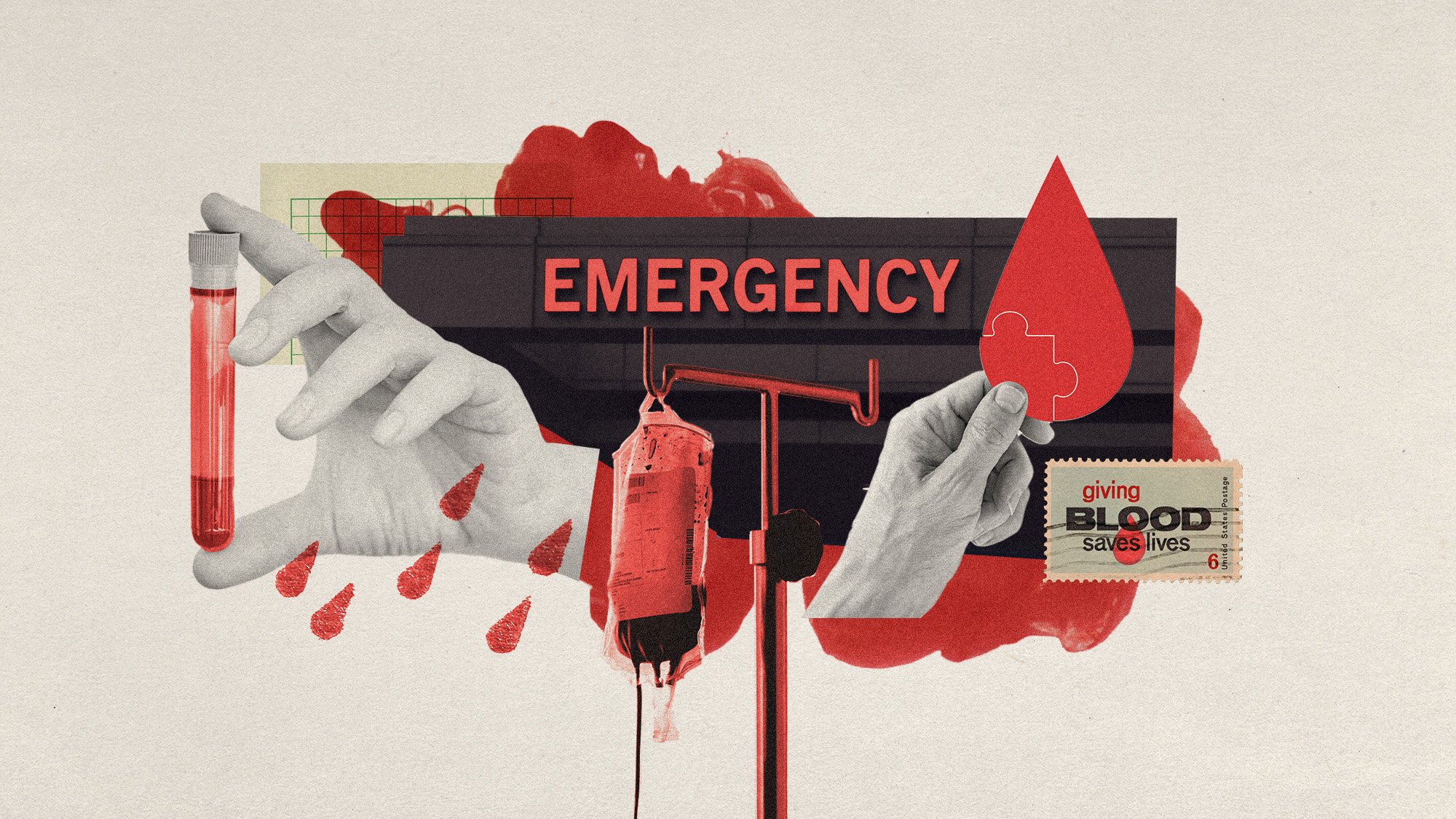Scientists are developing artificial blood for use in emergencies
It could aid in global blood shortages


A free daily email with the biggest news stories of the day – and the best features from TheWeek.com
You are now subscribed
Your newsletter sign-up was successful
Around the world, researchers are on a quest to create artificial blood. This blood would be universal and capable of lasting years, allowing it to be used in medical emergencies or remote locations. However, formulating an alternative to the crucial liquid of life is no easy feat.
Build-a-blood
Scientists want to "create the lab-grown burger of blood" or a blood substitute, "that bleeds — or at least operates in the body — almost exactly like the real thing," said The New Yorker. However, creating fake blood is notoriously difficult as "scientists don't yet understand everything that blood does, or how it does it." Despite this, they have begun to make headway.
In Japan, clinical trials are underway to "assess artificial blood, usable for all blood types and storable for up to two years, as a potential solution to critical shortages in blood supplies for emergency and chronic health care worldwide," said Newsweek. The artificial blood "contains hemoglobin molecules from expired donor blood, which are encapsulated in protective lipid shells to create artificial red blood cells," said News Nation. "The new mixture is capable of carrying oxygen throughout the body."
The Week
Escape your echo chamber. Get the facts behind the news, plus analysis from multiple perspectives.

Sign up for The Week's Free Newsletters
From our morning news briefing to a weekly Good News Newsletter, get the best of The Week delivered directly to your inbox.
From our morning news briefing to a weekly Good News Newsletter, get the best of The Week delivered directly to your inbox.
In Maryland, scientists have concocted similar artificial blood that can be freeze-dried to last for years. "It's designed so that at the moment it's needed, a medic can mix it with water and within a minute you have blood," said Allan Doctor, a scientist at the University of Maryland, to NPR. "The point is so you can give a transfusion at the scene of an accident." Real blood only lasts about 42 days. The artificial blood has already shown promise in rabbits, and the researchers are hopeful for human trials.
In the red
Currently, "approximately 118.5 million blood donations are collected worldwide, with 40% gathered in high-income countries, which comprise only 16% of the global population," said Al Jazeera. Experts estimate that "2,000 units of blood per 100,000 people are needed to meet global medical demands," but "severe shortages persist, especially in sub-Saharan Africa, South Asia and Oceania."
Access to artificial blood could save lives. More than 150,000 civilians in the U.S., and more than five million civilians globally, die each year from accidental injuries, many of which are attributed to blood loss. Also, a "large portion of the global population has limited access to blood transfusion treatment, said Newsweek. "Universal artificial blood could reduce preventable deaths in injury, surgery and childbirth," especially in low-income nations. In addition, the "No. 1 cause of preventable death on the battlefield is hemorrhage," said Col. Jeremy Pamplin, the project manager at the Defense Advanced Research Projects Agency that is funding research into artificial blood, to NPR. "That's a real problem for the military and for the civilian world."
Artificial blood could fill a crucial gap in the shortage. "But because this field has been so challenging, the proof will be in the clinical trials," said Tim Estep, a scientist at Chart Biotech Consulting who consults with companies developing artificial blood, to NPR. "While I'm overall optimistic, placing a bet on any one technology right now is difficult."
A free daily email with the biggest news stories of the day – and the best features from TheWeek.com
Devika Rao has worked as a staff writer at The Week since 2022, covering science, the environment, climate and business. She previously worked as a policy associate for a nonprofit organization advocating for environmental action from a business perspective.
-
 What to know before filing your own taxes for the first time
What to know before filing your own taxes for the first timethe explainer Tackle this financial milestone with confidence
-
 The biggest box office flops of the 21st century
The biggest box office flops of the 21st centuryin depth Unnecessary remakes and turgid, expensive CGI-fests highlight this list of these most notorious box-office losers
-
 The 10 most infamous abductions in modern history
The 10 most infamous abductions in modern historyin depth The taking of Savannah Guthrie’s mother, Nancy, is the latest in a long string of high-profile kidnappings
-
 Scientists are worried about amoebas
Scientists are worried about amoebasUnder the radar Small and very mighty
-
 Metal-based compounds may be the future of antibiotics
Metal-based compounds may be the future of antibioticsUnder the radar Robots can help develop them
-
 A Nipah virus outbreak in India has brought back Covid-era surveillance
A Nipah virus outbreak in India has brought back Covid-era surveillanceUnder the radar The disease can spread through animals and humans
-
 Deaths of children under 5 have gone up for the first time this century
Deaths of children under 5 have gone up for the first time this centuryUnder the radar Poor funding is the culprit
-
 A fentanyl vaccine may be on the horizon
A fentanyl vaccine may be on the horizonUnder the radar Taking a serious jab at the opioid epidemic
-
 More adults are dying before the age of 65
More adults are dying before the age of 65Under the radar The phenomenon is more pronounced in Black and low-income populations
-
 Scientists have developed a broad-spectrum snake bite antivenom
Scientists have developed a broad-spectrum snake bite antivenomUnder the radar It works on some of the most dangerous species
-
 Covid-19 mRNA vaccines could help fight cancer
Covid-19 mRNA vaccines could help fight cancerUnder the radar They boost the immune system
